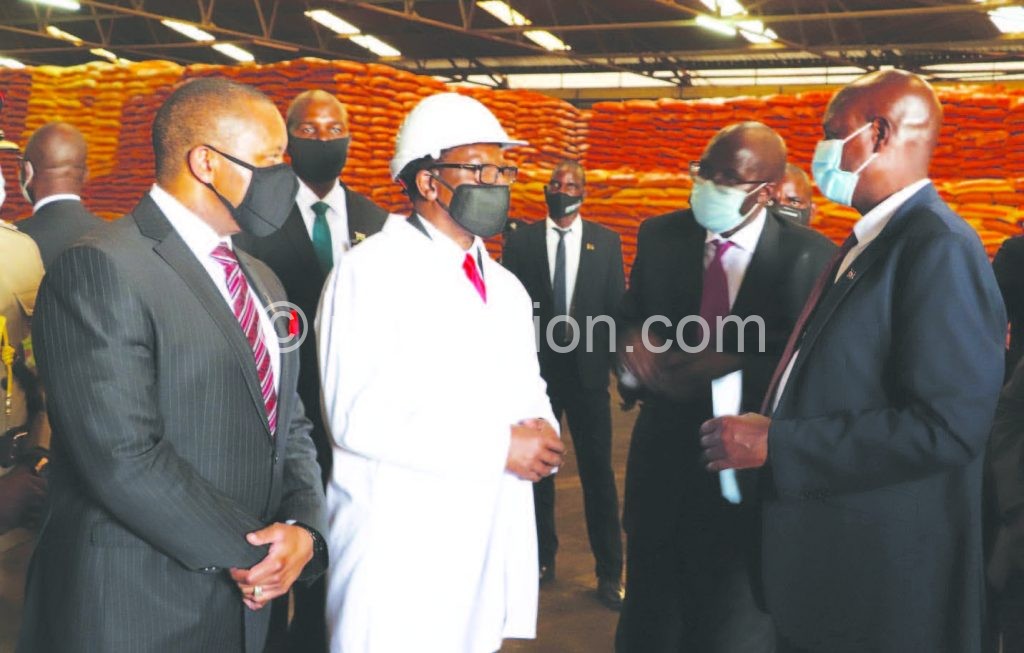Experts want more action on three-meals-a-day pledge
Fulfilling the metaphorical three-meals-a-day Tonse Alliance campaign promise would take more than just subsidies, experts have warned.
Within 100 days in office, the new administration has introduced the Affordable Inputs Programme (AIP) where 4.3 million farmers will access fertiliser at K4 495 per 50 kilogramme bag, but gender and governance consultant Wezzie Moyo and agriculture expert Tamani Nkhono Mvula in separate interviews called for more efforts in agricultural commercialisation, increased markets, crop diversification, improved transport infrastructure and more agriculture extension as the roadmap towards the food security goal.

Currently, the 2020 Food Security Vulnerability Assessment indicates that 2.6 million Malawians, or 15 percent of the 17.6 million population, will be food insecure in the 2020/21 consumption period.
According to Moyo, to turn that around, farmers need to be empowered with tools, including extension and proper markets.
“We need to move from just focusing on subsistence farming if we are to achieve the food security goal. There is need for an improvement in agriculture extension if farmers will optimise production,” she said.
Moyo reasoned that commercialisation of the agriculture sector would lead to the creation of more jobs, which, in turn would mean those currently unemployed would be able to put food on the table.
She said: “Farmers need capital to grow. We are underutilising our land since most of the potential farmers do not have the capital. The agriculture value chain would, in turn, increase employment.
“There is need to remove politics from Admarc and revitalise it so that farmers can reliably sell their produce, while at the same time people who need its services should find all sorts of produce right away.”
The AIP mainly targets maize. Although there are other crops like rice and legumes, Moyo believes these crops should also be considered.
“Not only do farmers need access to improved varieties of other food crops like bananas, cassava and sweet potatoes, they also need the right husbandry practices through extension services,” she added.
On his part, Nkhono Mvula agreed that diversification is important to attain the target, observing that a subsidy that focuses only on production for consumption cannot work to achieve food security.
“You will find that the subsidy is mainly focusing on maize grown during the rainy season. What happens when there is drought? The allocation to the subsidy has increased threefold, yet there is a 77 percent reduction in the allocation to livestock development. Maize is not the only food Malawians need,” he said.
Nkhono Mvula believed that there are other matters to look at than just the subsidy.
He said: “The markets must be vibrant. The transport infrastructure must be up to scratch to link the production and consumption ends. Further, we need an improvement in irrigation where the growing of horticultural crops can be encouraged.”
Speaking when he met the Parliamentary Committee on Agriculture, Admarc chief executive officer Felix Jumbe lobbied the committee, who are debating the proposed 2020/21 National Budget, to authorise the corporation’s proposal to borrow K300 billion for recapitalisation. The move comes at a time when Admarc has been seeking perpetual government bail outs.
Initially, the three-meals-a-day buzzword was in the UTM Party 2019 manifesto, so was the K4 495 price tag on a 50kg bag of fertiliser.
On the other hand, the Malawi Congress Party (MCP) manifesto loosely pledged to improve food security while gunning for a universal fertiliser subsidy.
On the campaign trail as Tonse Alliance, MCP leader Lazarus Chakwera and his UTM Party running mate Saulos Chilima promised three meals a day and fertiliser at a reduced price, from K23 000.
Speaking when he presented his maiden State of the Nation Address (Sona) in Parliament on September 4, Chakwera said the introduction of AIP will tremendously improve the level of productivity. He hinted at roping in tobacco companies to increase crop production.
“By working with tobacco companies, we can blend other crop types into the farmers’ mix over time. Diversification efforts such as this can contribute significantly to household food security while supporting the establishment of a more resilient agricultural system,” Chakwera said.
The opposition Democratic Progressive Party (DPP) has pegged the attaining of the three-meals-a-day promise as one of the benchmarks for the Tonse Alliance success.
In his response to the Sona, Leader of Opposition Kondwani Nankhumwa urged the Tonse Alliance not to be too excited.
“We urge the President not to fall into this trap because Malawians have high expectations. Among other things, Malawians cannot wait to start eating three meals a day and to start buying cheap fertiliser under a universal subsidy,” he said.
For some voters, like Daniel Macheso of Mbwana Village, Traditional Authority Chigalu in Blantyre, attaining food security will mark part of the Tonse Alliance success.
“Initially, I thought they meant that they would be giving three free meals to Malawians daily. Little did I know that it all entailed providing fertiliser and inputs at reduced prices. I hope this will help improve the food security,” he said.





